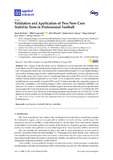Mostrar el registro sencillo del ítem
Validation and application of two new core stability tests in professional football
| dc.creator | Etxaleku, Saioa | es_ES |
| dc.creator | Izquierdo Redín, Mikel | es_ES |
| dc.creator | Bikandi Latxaga, Eder | es_ES |
| dc.creator | García Arroyo, Jaime | es_ES |
| dc.creator | Setuain Chourraut, Igor | es_ES |
| dc.date.accessioned | 2021-02-02T09:41:10Z | |
| dc.date.available | 2021-02-02T09:41:10Z | |
| dc.date.issued | 2020 | |
| dc.identifier.issn | 2076-3417 (Electronic) | |
| dc.identifier.uri | https://hdl.handle.net/2454/39129 | |
| dc.description.abstract | The purpose of the first study was to validate two newly proposed core stability tests; Prone Plank test (PPT) and Closed Kinetic Chain test (CCT), for evaluating the strength of the body core. Subsequently, these tests were employed in a longitudinal prospective study implementing a core stability training program with a professional Spanish football team. For the validation study, 22 physically active men (Tegner Scale 6-7) performed three trials of the PPT and CCT tests in two different testing sessions separated by one week. In the longitudinal study, 13 male professional football players were equally evaluated (PPT and CCT) before and after the competitive session in which they completed a core training program. Intra-/intersession, and intertester, reliability was analyzed. PPT and CCT demonstrated excellent to good test-retest reliability and acceptable error measurement (ICCs for intratester and intrasession reliability ranged from 0.77 to 0.94 for the PPT, and 0.8-0.9 for the CCT) in all but one of the testing conditions (female tester for CCT test; ICC = 0.38). Significant improvements on core strength were found from pre to post evaluation in both the PPT (p < 0.01) and CCT (p < 0.01) after the implementation of a core training program in professional football players. | en |
| dc.format.extent | 15 p. | |
| dc.format.mimetype | application/pdf | en |
| dc.language.iso | eng | en |
| dc.publisher | MDPI | en |
| dc.relation.ispartof | Applied Sciences, 2020, 10(16), 5495 | en |
| dc.rights | © 2020 by the authors. Licensee MDPI, Basel, Switzerland. This article is an open access article distributed under the terms and conditions of the Creative Commons Attribution (CC BY) license. | en |
| dc.rights.uri | http://creativecommons.org/licenses/by/4.0/ | |
| dc.subject | Core function | en |
| dc.subject | Football | en |
| dc.subject | Field test | en |
| dc.subject | Reliability | en |
| dc.title | Validation and application of two new core stability tests in professional football | en |
| dc.type | info:eu-repo/semantics/article | en |
| dc.type | Artículo / Artikulua | es |
| dc.contributor.department | Ciencias de la Salud | es_ES |
| dc.contributor.department | Osasun Zientziak | eu |
| dc.rights.accessRights | info:eu-repo/semantics/openAccess | en |
| dc.rights.accessRights | Acceso abierto / Sarbide irekia | es |
| dc.identifier.doi | 10.3390/app10165495 | |
| dc.relation.publisherversion | https://doi.org/10.3390/app10165495 | |
| dc.type.version | info:eu-repo/semantics/publishedVersion | en |
| dc.type.version | Versión publicada / Argitaratu den bertsioa | es |



